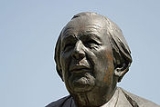
developmental psychologist and philosopher known for his epistemological studies with children. His theory of cognitive development
and epistemological view are together called "genetic epistemology
".
Piaget placed great importance on the education of children.
I am convinced that there is no sort of boundary between the living and the mental or between the biological and the psychological. From the moment an organism takes account of a previous experience and adapts to a new situation, that very much resembles psychology.![]()
As you know, Henri Bergson|Bergson pointed out that there is no such thing as disorder but rather two sorts of order, geometric and living. Mine is clearly living. The folders I need are within reach, in the order of frequency with which I use them. True, it gets tricky to locate a folder in the lower levels. But if you have to find it, you look for it. That takes less time than putting them away every day.![]()
Education, for most people, means trying to lead the child to resemble the typical adult of his society... But for me, education means making creators... You have to make inventors, innovators, not conformists.![]()
The principal goal of education in the schools should be creating men and women who are capable of doing new things, not simply repeating what other generations have done; men and women who are creative, inventive and discoverers, who can be critical and verify, and not accept, everything they are offered.![]()
From the point of view of the practice or application of rules four successive stages can be distinguished.
![]()
A first stage of a purely motor and individual character, during which the child handles the marbles at the dictation of his desires and motor habits. This leads to the formation of more or less ritualized schemas, but since play is still purely individual, one can only talk of motor rules and not of truly collective rules.
![]()

